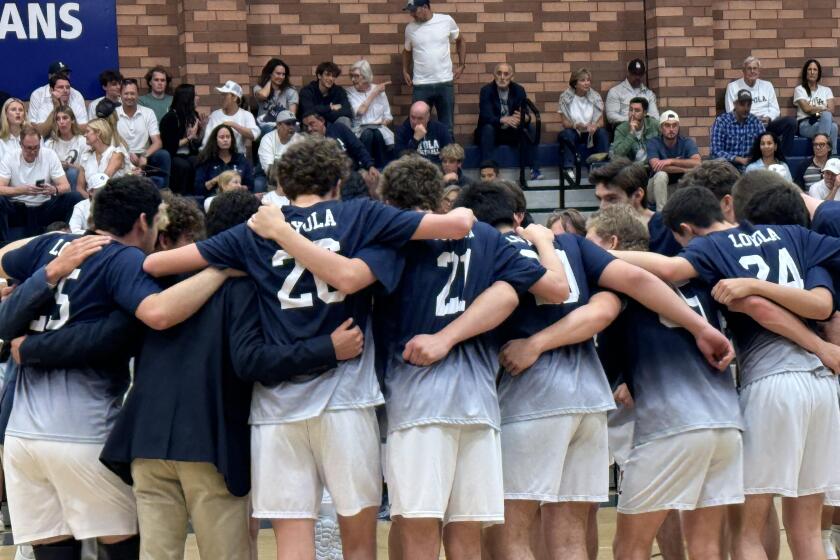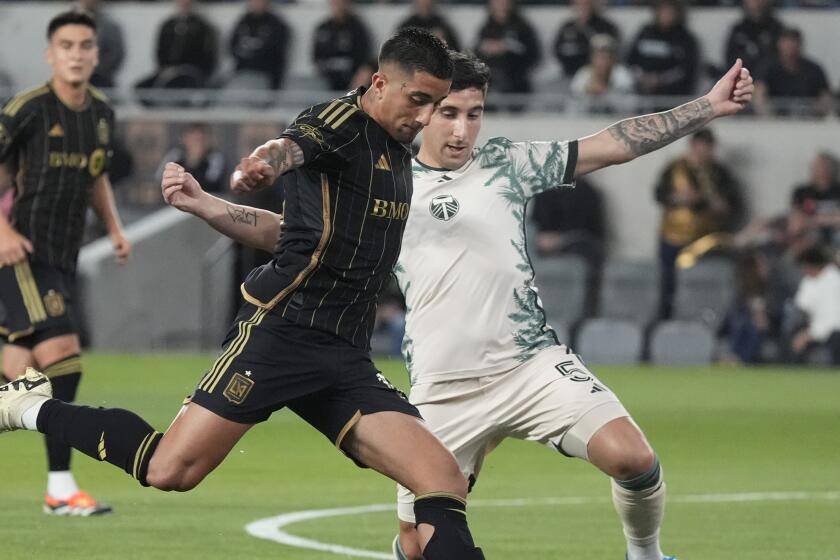Broncos Rely on Fearsome Twosome
Here come the Broncos.
Revived by quarterback Jake Plummer’s return from injury, Coach Mike Shanahan’s Denver team can take another giant step toward the playoffs today against Cleveland at Denver, where Bronco tailback Clinton Portis scored five touchdowns last Sunday.
After Cleveland, it gets tougher for Denver in its last two, at Indianapolis and Green Bay, where winter weather could be another enemy.
On a fast field, Plummer and Portis are probably the premier pair of offensive strikers in football.
As a twin threat in clear weather, only Green Bay’s Brett Favre and Ahman Green or Kansas City’s Trent Green and Priest Holmes seem to be a match for Plummer and Portis. As Kansas City (11-2) fell to Denver (8-5) last Sunday, 45-27, Plummer completed 20 of 29 passes for 238 yards and Portis raced for 218 yards.
Outplayed in the first half, 21-17, the Broncos came on aggressively in the second half, when Portis kept powering through the line and flying through open fields.
Rams Quit Long Ball
The St .Louis Rams can’t expect a cakewalk today against their only rival for first in the NFC West, the wildly inconsistent Seattle Seahawks.
For, sadly, the Rams have forgotten how to play pass offense.
Their spectacular turn-of-the-century Super Bowl teams attacked the whole field with an effective, lively assortment of all kinds of passes, some long, some short.
In Cleveland on Monday night, by contrast, Ram Coach Mike Martz strangely called mostly 15- and 16-yard passes that the Browns defended against knowingly -- so knowingly, that Martz’s offense was restricted to four field goals.
The 12 points helped a little but weren’t enough to win a 26-20 game that the Rams would have lost but for the 14 points Martz’s defense earned.
In the last two minutes of the first half, defensive back Aeneas Williams intercepted two Cleveland passes and ran one back all the way, 46 yards. With the second interception, he set up the second and last Ram touchdown, which materialized on a pass play.
A 16-yard pass play, of course.
It was delivered by quarterback Marc Bulger to veteran wide receiver Isaac Bruce, who, in the days when the Rams were throwing long passes, showed himself to be one of the great deep receivers.
Wide receiver Torry Holt can also go get it.
And Bulger can throw it. He’s a marksman at 30-plus yards.
There was none of that Monday night. Nor did Martz call much short stuff, the quick hot ones that Holt and particularly tailback Marshall Faulk run so well after catches near the line of scrimmage.
Instead, the Rams, who used to come out passing, came out running with Faulk, who on first-down carries totaled six yards on his first six runs and was never a factor in the decision .
The Rams are 10-3 and playoff-bound, but they can play better than this.
Winter Wonderland
The New England Patriots are getting another Southern team they can roast today.
That’s Jacksonville, which should expect even less luck at Foxboro than Miami and Dallas had in recent weeks. Both were blanked there, 12-0.
The Patriots’ Foxboro home has become the NFL’s new winter wonderland.
At the moment, the Patriots (11-2), who will be heading for their 10th straight victory, are leading the home-field race to the Super Bowl.
And with only the New York Jets and Buffalo left on the Patriots’ schedule, Coach Bill Belichick’s team is looking forward to playing the whole playoff series in wintry New England before taking off for the Super Bowl in Houston.
The prospect of a playoff game in a winter paradise is hardly the best of news for the AFC’s other contenders. A January football game at Foxboro isn’t a football test. It’s a test of who can win in a freeze.
Manning Versus Vick
The Indianapolis Colts and the four other AFC contenders -- Denver, Kansas City, Tennessee and Baltimore -- are all looking up at New England today, in geographical terms and in won-lost terms.
On a neutral field, I’d take Denver, but the NFL’s club owners don’t believe in neutral fields for playoff games.
The Colts -- home today to the rejuvenated Atlanta Falcons in a game that will pit passer Peyton Manning against runner-passer Michael Vick -- are widely believed to have the best shot at the AFC title.
But under Coach Tony Dungy, the Colts are turning out to be the dead opposite of an aggressive football team.
They’re led by potentially aggressive offensive stars Manning and tailback Edgerrin James, who, however, were the principals last Sunday in another muted, tightly controlled offense that barely held off the injured Titans at Tennessee, 29-27.
Although Indianapolis’ coaches insist on running James to set up Manning’s passes, this has the look of a team that would pound most opponents -- instead of just squeaking by -- if it attacked with Manning’s passes to set up James’ runs.
An attacking offense in modern football is one that lines up on first down and hits the other team with various kinds of passes. Then it follows up with either another kind of pass or a quick strike by its running back.
That’s how Plummer and Portis attacked Kansas City in the second half last Sunday. By contrast, the Colts played as if an intercepted pass was the worst possible human disaster.
One-Dimension Titans
The Titans keep losing these days in Colt fashion, with a potential NFL MVP, their ailing but active quarterback Steve McNair, and ground-offense players who are demonstrating more explosiveness in this half of the season than they showed in the first half.
But as coached by archconservative Jeff Fisher, the Titans, with multiple-dimension athletes, are still playing single-dimension football.
On any given Sunday, for as long as the score is close, the Titans run tailback Eddie George as if they were a single-dimension running team. Then when they fall behind, they turn to McNair’s passes as if they were a single-dimension passing team.
They looked up McNair again in the fourth quarter Sunday, after Fisher had reluctantly abandoned his running game and asked his quarterback to save him in the final minutes, when the Titans appeared to be a beaten team, 29-13. He almost did.
Throwing on nearly every down, McNair drove the Titans to a sudden touchdown and sneaked across for the conversion, narrowing the Colt lead to 29-21. Then, after a typical, conservative, three-and-out Colt response, McNair, again throwing on almost every down, drove the Titans to a second touchdown.
But as the Colts made a heads-up defensive play, McNair’s last pass, a try for two points, was tipped away to preserve Indianapolis’ 29-27 win.
As usual, McNair’s was the kind of football that would have turned back Manning easily if, in the first three quarters, Fisher had allowed it.
Bronco Example
In the Cleveland game today, the Broncos will have a chance to prove that they can play with style consistently -- in consecutive weeks -- which they haven’t really done lately.
To get a leg up on Kansas City last Sunday after the Chiefs had taken a four-point lead, the Broncos, in the third quarter, drove 78 yards in 12 plays, illustrating the way a good NFL team does it when integrating passes by a quarterback as good as Plummer with ground plays by a running back like Portis.
Confounding the coaches who claim that third down is the most important NFL down, Shanahan’s game plan was plainly designed to keep the Broncos out of third down. Thus he was obliged to make only one third-down call on that drive.
And for that, Shanahan was ready with a special play. He had Plummer throw to 6-foot-5 wide receiver Ed McCaffrey, who otherwise these days isn’t much involved in the offense.
With first down at the Kansas City five, the Broncos first tried Portis, who gained two yards. Then on second and goal, Shanahan chose a pass that went for a touchdown to reserve running back Reuben Droughns, surprising the Chiefs.
Perhaps an even bigger surprise is the way the new Bronco quarterback seems to be catching on to Shanahan’s system. There were those who, watching Plummer in recent years on the Arizona team, said he’d never make it anywhere. Moreover, his long absence with a broken foot severely slowed the Broncos, leaving them with no chance for a home playoff game.
Because of his limited experience on a real NFL team, Plummer clearly isn’t the quarterback he might be for Denver or quite probably will be. Normally it takes a season or two at least, in the same system, to make an NFL quarterback. And Plummer has had hardly a half season. The promise, though, is there.
More to Read
Get our high school sports newsletter
Prep Rally is devoted to the SoCal high school sports experience, bringing you scores, stories and a behind-the-scenes look at what makes prep sports so popular.
You may occasionally receive promotional content from the Los Angeles Times.






